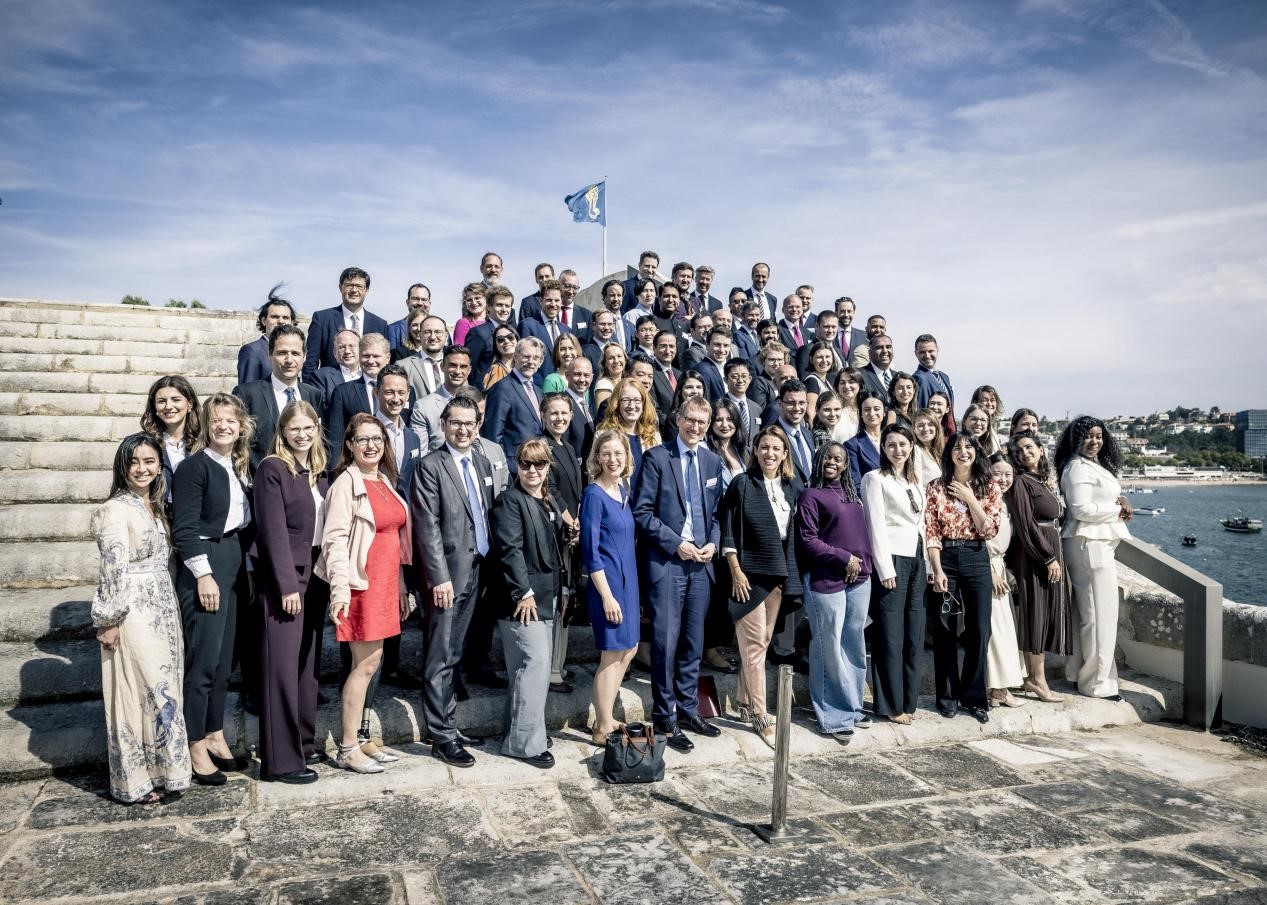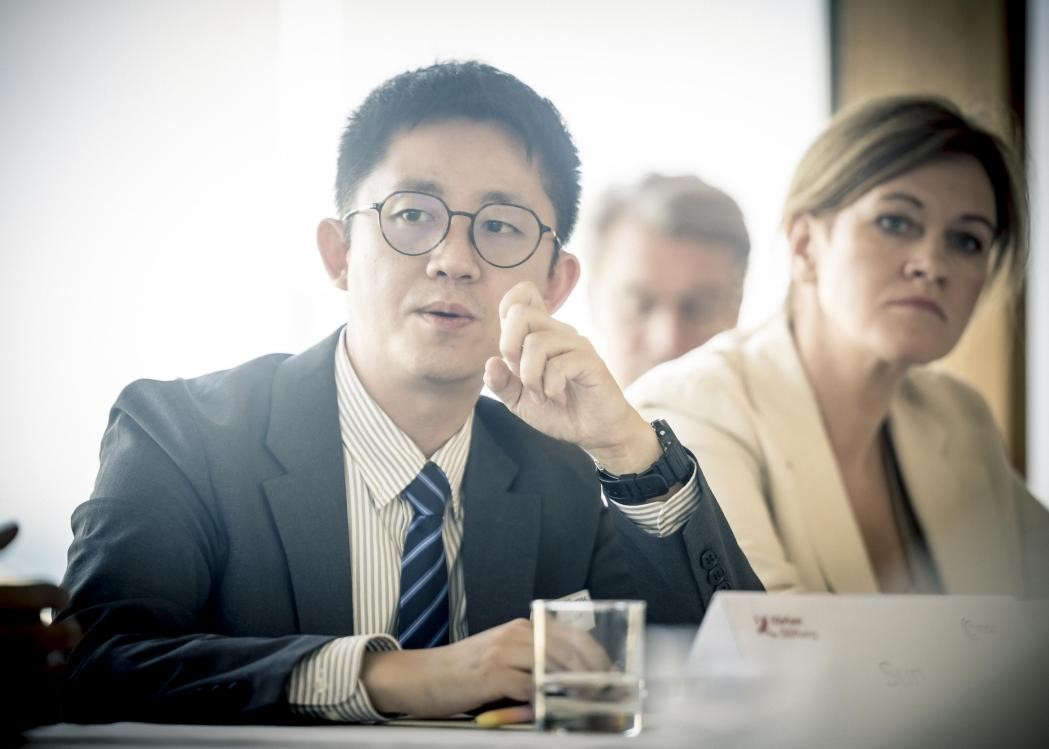Europe retains global influence in areas such as multilateral governance, the green transition and technological innovation. If it can craft a new synthesis between strategic autonomy and transatlantic cooperation, it may yet play an independent role in the emerging great-power landscape.

Group photo of the 2025 Munich Young Leaders Annual Meeting organized by the Munich Security Conference in Lisbon. (Photo: MSC/Kuhlmann)
In early autumn, I attended the 2025 Munich Young Leaders Annual Meeting organized by the Munich Security Conference in Lisbon, Portugal. The event drew 80 attendees, mostly from Europe and the United States. While the sunlight along the Tagus River outside the venue was gentle, the discussions inside about the future of the international order, transatlantic relations and European security reflected a deep sense of unease. Facing intensifying great-power competition, growing divides across the Atlantic and mounting pressures on its defense architecture, Europe seems to stand at a crossroads where it must redefine its strategic role.
The unease is crystallizing into three layers of anxiety — over the future of the international order and multilateralism, over transatlantic relations and over Europe’s defense capabilities. These three intertwined threads are shaping Europe’s strategic mindset and trajectory.
For the past three decades, Europe has viewed itself as a guardian of the international order, with multilateralism being its most prominent strategic asset. Yet the security and economic frameworks jointly shaped by Europe and the U.S. after the Cold War are loosening, and the multilateral platforms on which Europe built its influence are increasingly losing effectiveness.
The United States once provided both security guarantees and market access, but shifting global power dynamics are altering that foundation. Washington’s strategic focus is moving toward the Indo-Pacific region, and its security commitments are becoming more selective. Economically, U.S. policy has shifted from openness toward defensive geo-economic measures, relying more on tariffs, sanctions and export controls. In the realm of values, the once-shared liberal consensus across the Atlantic is fragmenting, and issues such as democracy, human rights and trade rules no longer automatically produce transatlantic policy coordination.
Against this backdrop, Europe realizes that values-based diplomacy alone is insufficient to shape the international order. The vacuum in global governance is widening, while the logic of great-power competition now permeates nearly all policy domains — from supply chains to energy, from the green transition to technology. The weakening of multilateralism forces Europe to take positions on more issues, sometimes even adopting strategies that diverge from Washington’s. Yet such choices are constrained by Europe’s continued dependence on the U.S. for security, technology, energy and financial infrastructure.
Europe aspires to maintain its global role as a champion of multilateralism, yet it must confront the reality of a gradually fragmenting international system. Trump’s demand that Europe shoulder more security responsibility has complicated NATO-EU-member coordination. In trade, the U.S. is bypassing the WTO in favor of “mini-lateral” or even bilateral arrangements. In technology, U.S. export controls on semiconductors and AI chips have raised new barriers. Multilateralism, once Europe’s institutional strength, is now the source of a strategic dilemma.

Sun Chenghao speaks at the 2025 Munich Young Leaders Annual Meeting in Lisbon. (Photo: MSC/Kuhlmann)
Europe’s second anxiety stems from transatlantic relations themselves. Trump’s return to the White House has amplified uncertainty. In recent years, Europe has gradually adapted to Trump’s “America first” doctrine, but his re-election signals a deeper shift, from an alliance rooted in shared values to a partnership driven by transactional calculations. U.S. security guarantees are increasingly conditional and require greater European defense spending, while its economic policies integrate security and industrial interests, evaluating allies and competitors under the same framework.
For Europe, this is not only a crisis of trust but also a compression of strategic space. Trump’s plans to impose higher tariffs on a wide range of imports, even when targeted at China, risk spillover effects into Europe’s automotive, energy, and high-tech sectors. Frustration is mounting across Europe over U.S. technology policy, yet the EU struggles to coordinate a unified response.
Underlying these tensions are Europe’s internal divisions. France advocates “strategic autonomy” and reduced reliance on Washington, while Central and Eastern European states, which face direct security threats, generally favor a stronger U.S. military presence. Such strategic divergences make the transatlantic relationship more prone to bilateralism under Trump 2.0, weakening EU-wide coordination. Europe is striving to balance cooperation with Washington and its pursuit of autonomy, but U.S. unpredictability in security, industry and energy keeps Europe on the defensive.
The third anxiety centers on Europe’s defense capabilities. The Russia-Ukraine conflict has profoundly reshaped Europe’s security environment, forcing the EU to confront a hard reality: If the U.S. reduces military aid to Ukraine, Europe must shoulder the security burden alone. The EU has launched its ReArm Europe Plan, aiming to boost defense capabilities through joint procurement, collaborative R&D and a dedicated defense fund. Yet an enormous gap remains and must be closed before Europe can achieve genuine strategic autonomy. Structural weaknesses plague the defense industrial base — fragmentation, lack of standardization, limited production capacity and continued dependence on U.S. technologies and resources.
NATO’s future appears increasingly uncertain. As Washington transitions from security provider to offshore balancer, Europe must assume more conventional defense responsibilities. Yet internal EU political realities make this difficult. France and Germany diverge on defense integration, while Central and Eastern Europe resist sacrificing U.S. security ties for EU-led defense. The rise of far-right populist forces across member states further constrains fiscal mobilization.
In Europe’s younger generation, there is both aspiration and skepticism toward defense autonomy. Europe is entering a period of strategic transition driven by external pressures, shifting from values-centric diplomacy to a mix of hard power and values. However, political, financial and societal constraints inject high uncertainty into this effort.
In Lisbon, I felt that Europe’s anxiety was not an emotional overreaction but a structural strategic dilemma. The fracturing of the international order, eroding transatlantic trust, and the urgent need for defense autonomy are shaping Europe’s mindset. Over the next three to five years, Europe’s policy choices will revolve around one central question: how to strike a new balance between multilateralism, transatlantic relations and defense autonomy. If this balance cannot be achieved, Europe risks becoming a reactive follower in global competition, struggling both to shape international rules and to safeguard its own interests.
But anxiety also brings opportunity. Europe retains global influence in areas such as multilateral governance, the green transition and technological innovation. If it can craft a new synthesis between strategic autonomy and transatlantic cooperation, it may yet play an independent role in the emerging great-power landscape.
For China, Europe’s commitment to multilateralism, the restructuring of its defense industry and the rebalancing of its external strategy could open up new avenues for cooperation. From climate policy to supply chain resilience, from AI governance to the provision of global public benefits, future China-Europe relations may see new possibilities emerging within a framework in which competition and cooperation coexist.
